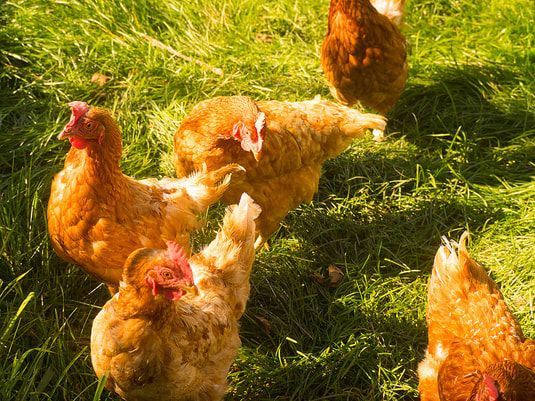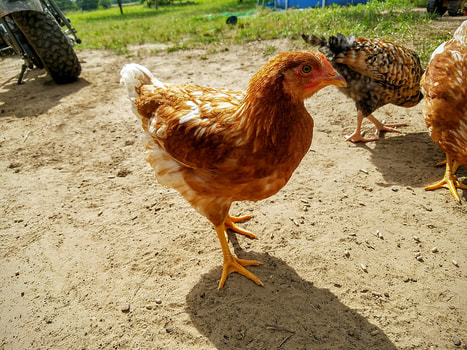Symptoms of Vitamin A Deficiency in Chickens

Tests performed on baby chicks showed that a Vitamin A deficiency can cause birds to get very sick and die. Vitamin A deficiency in chickens usually happens when the birds have no access to green foliage. (Most often during hot dry summers). Symptoms develop slowly and outward signs of Vitamin A deficiency may not become evident for 3 weeks or more. If you observe and inspect your chickens closely every day you have a better chance of detecting that something is wrong with their health early so that you can take the appropriate measures to help them before it gets to advanced stages.
Early stages of Vitamin A Deficiency in Chickens
"their location FIGURE 2. (see pdf)—Pustulelike lesions in the esophagus caused by vitauiin A deficiency. (Courtesy of L. D. Bushnell, Bacteriology Deparluient, Kansas Agricultural Experiment Station.) and severity depending to some extent on the age of the bird, the degree of the deficiency, and the length of time between the appearance of the first symptoms and death. In mature birds lesions resembling pustules are almost invariably found in the mouth, pharynx, and esophagus (fig. 2) ; in young growing birds these are seen much less frequently. Usually there are white or grayish-white deposits of urates iu the kidneys and ureters, which occur more frequently in the chick than in the poult. Sometimes there are deposits of urates on the surface of the heart, liver, and spleen. Hinsliaw and Lloyd have reported that they found white, flaky, uratelike deposits between thickened folds of the bursa Fabricii in most of the poults and chicks they examined, and Heywang and Morgan have confirmed their findings in the case of the chick" (Harry W. Titus, Senior Biological Chemist in charge of Poultry Nutrition Investigations in the Animal Nutrition Division of the Bureau of Animal Industry).
Early stages of Vitamin A Deficiency in Chickens
- Rate of growth slows and then declines rapidly
- Droopiness
- Staggering gait
- Feathers appear ruffled
- Pale comb and wattles
- Swelling around the eye with white cheesy substance on the eyelid
- Nasal discharge
- Swelling around the eyes with sticky discharge
- White membranes form over the nictitating membrane (a membrane chickens, birds, reptiles and some other animals have that closes over the eye to protect it from dust and to keep it moist).
"their location FIGURE 2. (see pdf)—Pustulelike lesions in the esophagus caused by vitauiin A deficiency. (Courtesy of L. D. Bushnell, Bacteriology Deparluient, Kansas Agricultural Experiment Station.) and severity depending to some extent on the age of the bird, the degree of the deficiency, and the length of time between the appearance of the first symptoms and death. In mature birds lesions resembling pustules are almost invariably found in the mouth, pharynx, and esophagus (fig. 2) ; in young growing birds these are seen much less frequently. Usually there are white or grayish-white deposits of urates iu the kidneys and ureters, which occur more frequently in the chick than in the poult. Sometimes there are deposits of urates on the surface of the heart, liver, and spleen. Hinsliaw and Lloyd have reported that they found white, flaky, uratelike deposits between thickened folds of the bursa Fabricii in most of the poults and chicks they examined, and Heywang and Morgan have confirmed their findings in the case of the chick" (Harry W. Titus, Senior Biological Chemist in charge of Poultry Nutrition Investigations in the Animal Nutrition Division of the Bureau of Animal Industry).
How Vitamin A Helps Chickens
Vitamin A is essential for chicken health.
- Aids in cell repair particularly in the mouth, lung, and kidneys.
- Good for the eyes.
- A lack of Vitamin A can damage the mucous membranes making it easier for bacteria to get in.
Most likely causes of Vitamin A Deficiency
- Drought or drought like conditions (hot dry summers) which result in a lack of green foliage.
- Closely confined or overcrowded living conditions (unless a sufficient amount of Vitamin A is provided in the feed).
- Unstable mixed feeds or feeds kept improperly that loses its vitamin value.
How Much Vitamin A Do Chickens Need?
"Vitamin A requirements for chickens are:
- Growing chick-675 to 775 International units per pound of feed
- Young poult is about 2i/^ times as much.
- Hens kept for egg production-The feed of chickens kept for egg production should contain approximately 3,150
- Breeding stock (chickens or turkeys)—should contain about 4,720 units,per pound.
Rich Sources of Vitamin A for Chicken Feed
Rich Sources of Vitamin A for Chickens and Turkeys (International Units per Pound)
(International units per pound)
Fortified cod-liver oil 1,360,770
Fortified sardine oil 1,360,770
Cod-liver oil 385,550
Sardine oil 52,000
Alfalfa-leaf meal, dehydrated. 95,000
Alfalfa-leaf meal 32,000
Alfalfa meal 13,000
Corn-gluten meal 6,800
Yellow corn 3,180
(International units per pound)
Fortified cod-liver oil 1,360,770
Fortified sardine oil 1,360,770
Cod-liver oil 385,550
Sardine oil 52,000
Alfalfa-leaf meal, dehydrated. 95,000
Alfalfa-leaf meal 32,000
Alfalfa meal 13,000
Corn-gluten meal 6,800
Yellow corn 3,180
Do Chickens Need Vitamin Supplements?

Chickens should get all of the vitamins, nutrients and proteins from the food that you give them. This is the best way for your birds to absorb the vitamins and nutrients. If they are not getting them they will start to get sick and could die if left untreated. If your chickens are very healthy, have shiny, non ruffled feathers, are acting normally, are active, have no build up on the vent area, no raised scales on their legs, no pustules on the hair follicles, or odd growths, no lesions, clear eyes, and their comb, wattles and ear lobes are the color they are supposed to be, then No, your chicken most likely does not need a vitamin supplement. If your birds are getting all of the vitamins, proteins, and nutrients they need from what you are feeding them they will be healthy looking and active unless they get exposed to a contagious poultry disease which can easily happen when introducing new birds into the flock, when other people who may have sick chickens come onto your property (some poultry diseases can cling to shoes, clothing, automobile tires, etc.), wild birds who eat and drink from your chickens food and water dishes, taking your chickens to poultry shows, etc. Keep your chickens well fed (don't overdo it with treats) and make sure they have clean water at all times, clean dry bedding, and don't expose them to people and things that can make them sick and you should have no problems. Giving your chickens a vitamin supplement once a week can help boost their immune system.
References:
Titus, Harry W. Nutritional Diseases of Poultry. (2018). Naldc.nal.usda.gov. Retrieved 2 June 2018, from https://naldc.nal.usda.gov/download/IND43893805/PDF
Titus, Harry W. Nutritional Diseases of Poultry. (2018). Naldc.nal.usda.gov. Retrieved 2 June 2018, from https://naldc.nal.usda.gov/download/IND43893805/PDF

